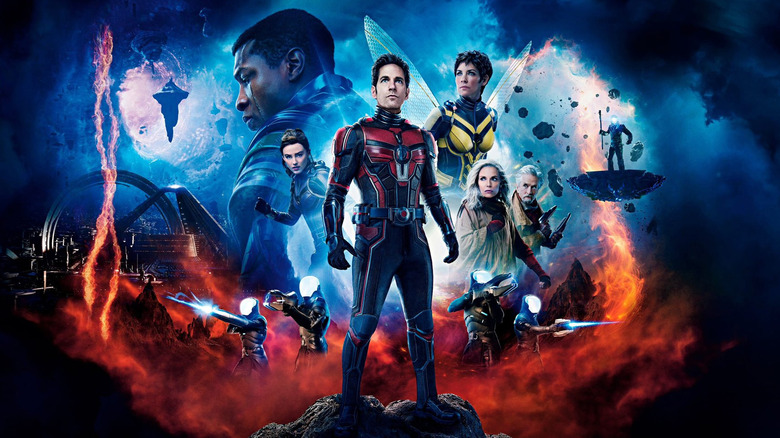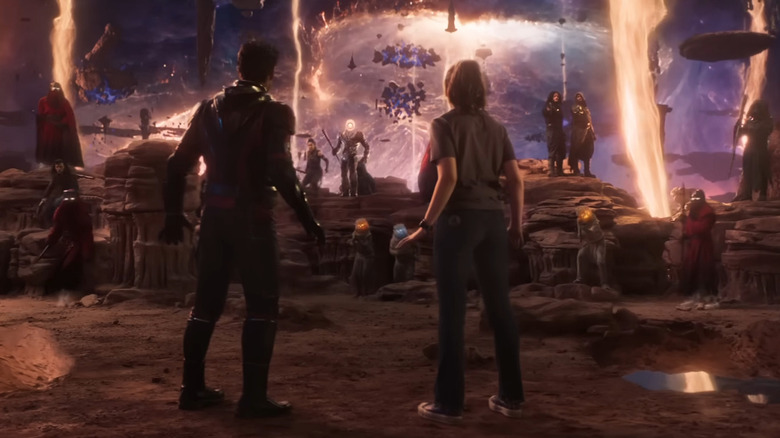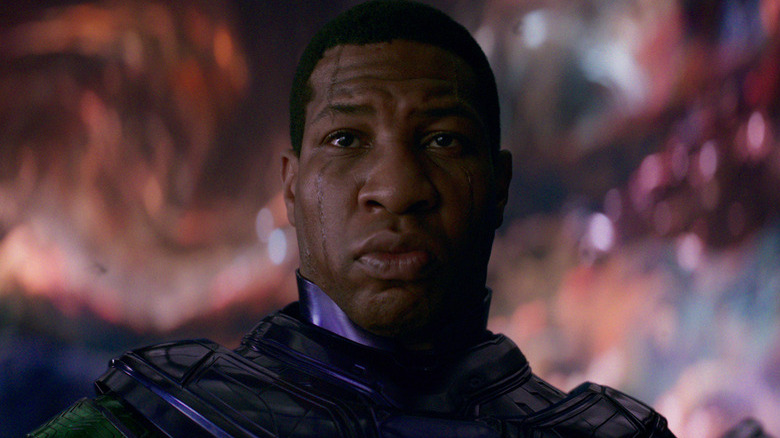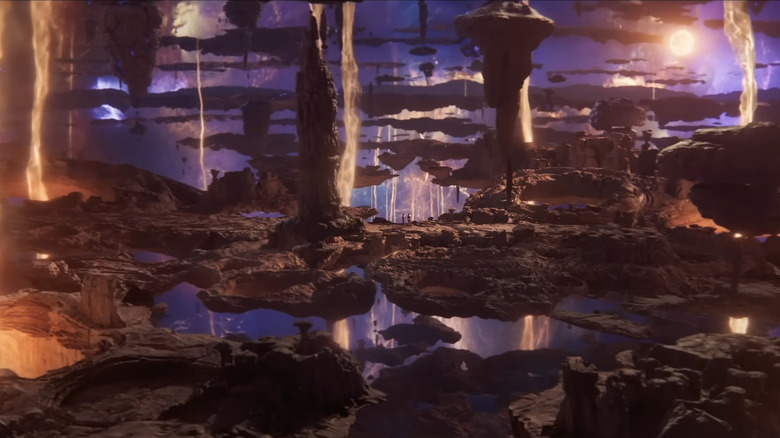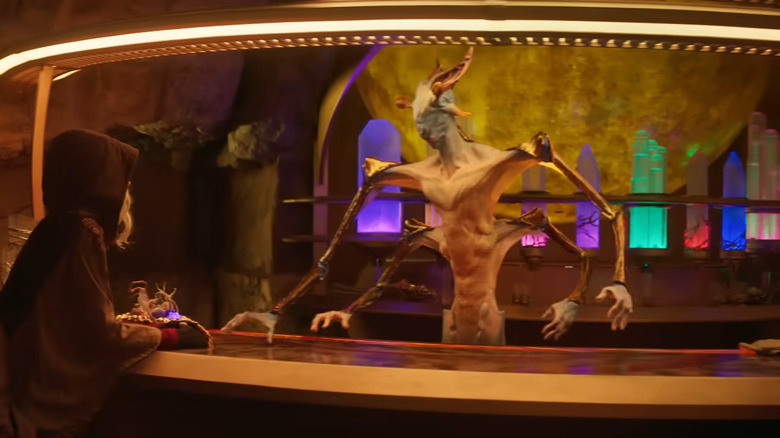Quantumania Is A Step Backward For The Ant-Man Series (By Trying To Be An Avengers Movie)
The following article contains spoilers for "Ant-Man and The Wasp: Quantumania."
"Ant-Man and The Wasp: Quantumania" is in theaters now, bringing us the further adventures of Ant-Man aka Scott Lang (Paul Rudd), his daughter Cassie (Kathryn Newton), his partner Hope van Dyne/The Wasp (Evangeline Lilly), and her parents Janet van Dyne (Michelle Pfeiffer) and Hank Pym (Michael Douglas). This time around, the happy-go-lucky size-changing superhero is resting on his laurels after saving the 50 percent of the population that was dusted in the Blip. He's written a memoir, which you can actually buy in September, and he's wandering around town, enjoying his fame and the free coffee that goes with it — even if the barista calls him Spider-Man. (I mean, that's fair. No one knows who Spider-Man really is, right?) Hope has been using Pym particles to make the world a better place along with her parents, but Cassie has another plan. She's found a way to send a signal down to the Quantum Realm.
Janet, who spent a good three decades there and hasn't told her family anything about it, is upset, and rightly so. The family gets sucked through a portal and into the Quantum Realm, where they meet some of the residents and learn about the threat from Kang the Conqueror (Jonathan Majors) ... you know, one of the variants He Who Remains warned Loki (Tom Hiddleston) and Sylvie (Sophia di Martino) about in "Loki" season 1.
If that setup seems complicated, that's nothing, folks. The film is not what you think it's going to be.
Bigger doesn't always equal better
If you, like me, are a fan of the first two "Ant-Man" films, the third entry may not be quite what you were expecting. "Ant-Man" and "Ant-Man and The Wasp" (for the love of Ant-thony, vary the titles a bit) were charming films, smaller in scale than some of the other Marvel Cinematic Universe offerings, and a breath of fresh air because of it. "Quantumania," however, is complicated, unclear — full of CGI, unexplained characters, and visually exhausting. It's frustrating to those of us who really needed the break from the increasingly complex MCU that is starting to require a Master's degree in Marvel Comics to keep up.
Bigger isn't always better. Making things smaller in scale can be exactly the right call, something Ant-Man should know better than the rest of us. The first two films introduced us to Scott, who was the friendliest criminal. Seemingly always good-natured, he gave us a look at what it takes to refocus on the world instead of yourself. He was fun and light, and along with Luis (Michael Peña) and Kurt (David Dastmalchian), the banter was enough to refresh fans' joy in the MCU.
Look, things get dark in the world of these comic-based films and, now, TV shows. There are constant existence-ending threats. The world has to accept the aliens, other inhabited planets, and a whole lot of beings who want to kill them off. Sometimes it's important to pare down and tell a smaller story to remind ourselves that everyone isn't standing in an outward-facing circle with weapons all the time, serious and ready to fight. Sometimes heroes are just like us ... albeit with some super cool tech that changes their sizes.
Big threat, little threat
In a way, this is the debate fans often have with fantasy shows and films. High fantasy is all about epic threats and a quest that excludes everyday life. Frodo and Sam gave up everything to take the ring to Mordor in "The Lord of the Rings." Luke Skywalker had to focus on taking down the Death Star to save the galaxy. These stories are wonderful and entertaining, but everything is on such a grand scale. The world is in peril, so we can't focus on what it's like to be human. We don't see joy other than a bunch of cheering when the hero(s) wins.
Low fantasy is more about, say, a farm boy who wants to impress a beautiful girl, becomes a pirate, then has to chase down those who kidnapped her. (Yes, I'm talking about "The Princess Bride.") It's smaller in scale, and you get to know the people involved. There is time for jokes and laughter and a lighter tone.
The Ant-Man films were very much low fantasy. Scott was involved in the rest of the MCU, but when we see him alone, we get to watch him master drums or close-up magic. We get a little break from the complex nature of reality. Now that the MCU has broken open the multiverse, things are even more complicated. There is no more room for a calming pause, I guess because "Quantumania" is four hours of a film in a two-hour slot. I tried to take notes during my screening, and I couldn't keep up.
My eyeballs hurt
Packing so much into this film took away from Ant-Man's (and Paul Rudd's) charm and joy. We've got the very muddled introduction of Kang the Conqueror, whose motives and plan are convoluted. There is the backstory of his association with Janet. There's the fact that she never bothered to warn anyone about what would happen if they contacted the Quantum Realm. The parent/child relationships of two generations are completely lost outside of Scott being super nice about Cassie putting the entire multiverse in peril or Janet's silence allowing that to happen in the first place. Characters are introduced like Quaz (William Jackson Harper) and Jentorra (Katy M. O'Brian) that we either barely get to know outside of labels like telepath and warrior or used as a mere setup for a joke.
Sentient buildings walk around here, but other than a single comment about it, we never learn more. We visit what appears to be the Cantina from "Star Wars" and meet Krylar, a guy Janet has a past with, but he's there for one scene and didn't need to be. (It felt like Bill Murray decided to do an MCU film on a whim, and they tried to find a way to get him in for a day-long shoot.) M.O.D.O.K. in a live-action film might sound intriguing to some, but it absolutely doesn't work and could have been cut without anyone noticing. Frankly, I would rather have watched the post-credits scene as an entire film instead of the CGI-eyeball blast that was the Quantum Realm. Look, if you're going to have us spend 80 percent of the movie there, maybe we could get some time to actually learn about it.
We need a break
The MCU is very complex. After my screening, I heard multiple people asking what the heck Kang was talking about because they hadn't seen the "Loki" series. We've reached a point where you really do need prior knowledge to figure out what's going on, particularly with the multiverse. I'm not saying we shouldn't have that. After all, there are a whole lot of fans who follow everything and read comics who don't want everything watered down or over-explained. I've seen every minute of every MCU thing, though, and I still have to do homework beforehand and research after. Depending on whether you count "The Incredible Hulk" or not, there are either 31 or 32 MCU films out now, in addition to (if you don't count "Agents of S.H.I.E.L.D.," "Agent Carter," "Inhumans," the Netflix shows, or several smaller shows on other networks) the eight Disney+ shows that are already out with so many more on the way. That's a lot of lore to keep in mind, even if you're not looking for deep cuts and Easter eggs.
Complexity is fine, but sometimes we need a break — a palate cleanser, so to speak. That's what the Ant-Man films have been. There is a whole lot of superhero fare on the way, and it's only going to get more complicated. Audiences needed the fun and calm of an Ant-Man film to give us an in-universe moment to process everything that's happened.
I miss Luis.
